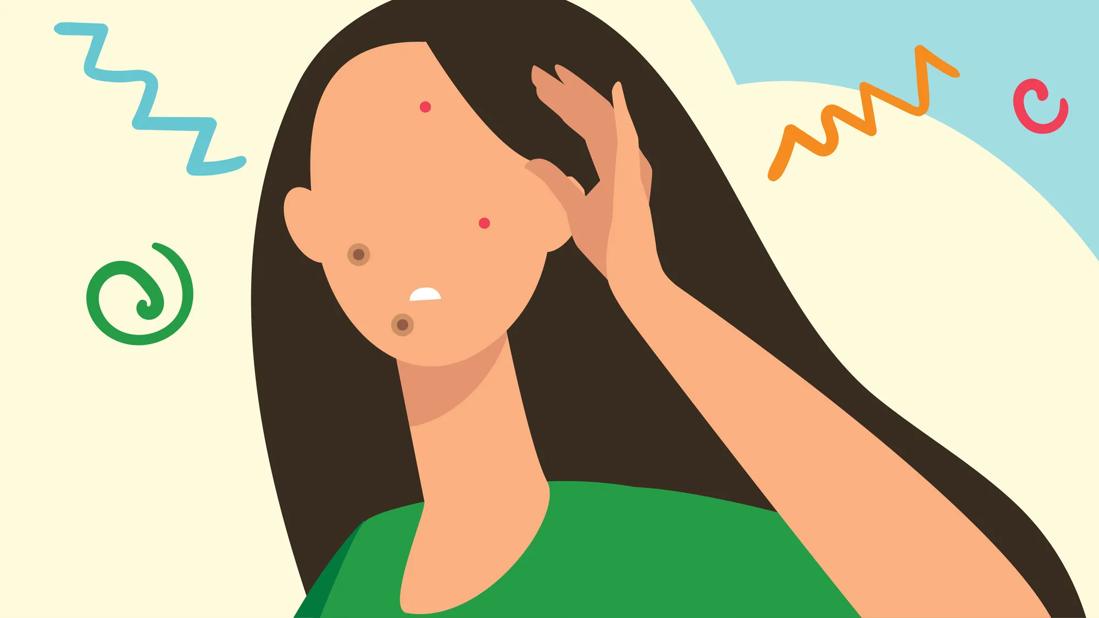A dermatologist weighs in on whether zit stickers are worthwhile

Image content: This image is available to view online.
View image online (https://assets.clevelandclinic.org/transform/99993c7b-ff32-49b8-b856-f2d3f3bbb40c/PimplePatch-1290103045-770x533-1_jpg)
Illustration of person with pimples on their face
The cardinal rule of acne is “don’t pick,” but when you’re faced with a whitehead that seems to have its own zip code, sometimes, all logic flies out the window. If you’ve broken the rules (and gone against dermatologists’ advice) by taking matters into your own hands, you may be left with the gory aftermath: An open wound leaking pus, oil and even blood.
Advertisement
Cleveland Clinic is a non-profit academic medical center. Advertising on our site helps support our mission. We do not endorse non-Cleveland Clinic products or services. Policy
Enter pimple patches, sometimes known as zit stickers, which may be able to help soothe your skin in a pinch. Dermatologist Amy Kassouf, MD, explains what these over-the-counter spot treatments can — and can’t — do for your skin troubles.
Pimple patches are small stickers made with a slightly gummy wound-healing gel called hydrocolloid. Larger versions are marketed as “blister bandages,” but they’re all designed to do the same thing: Help your skin heal faster.
“Pimple patches work by absorbing any drainage from the pimple and covering the wound to prevent further trauma to the site, such as picking,” Dr. Kassouf explains. “They work best on open, draining, healing pustules, papules and cysts.”
Of course, you know you’re not supposed to pick at your skin or pop zits. But if you’ve already committed this skin care sin, a pimple patch may be a helpful healer.
Most pimple patches need to be worn for a few hours in order to do their thing, so you may want to plan to apply yours before bed. Some versions are also designed to be inconspicuous enough to be worn during the day.
Before applying your pimple patch, make sure your skin is completely dry, as the patches won’t stick as well to wet skin. If your freshly picked pimple is leaking or oozing, be sure to cleanse the spot before application.
Advertisement
Simply apply the pimple patch over your zit — remember, they only work on open wounds — and leave it on for the recommended amount of time (which varies by product). When you peel it off, your blemish may be smaller and less inflamed.
For most people, pimple patches are, at worst, simply unhelpful — which is to say that they won’t make your acne worse, but they won’t make it better, either. If you have sensitive skin, though, you may want to steer clear of pimple patches.
“They do use a bit of adhesive to stick to your skin, so if you’re allergic or sensitive to adhesive, this may aggravate the skin surrounding the lesion,” Dr. Kassouf says.
And some brands use ingredients such as salicylic acid or tea tree oil to dry out pimples, which may also dry or irritate sensitive skin.
Though pimple patches can be very effective on existing lesions, they have significant limitations.
“Pimple patches don’t work at all on closed lesions or deeper lesions or even blackheads and whiteheads, which are called comedones,” Dr. Kassouf explains. “They are spot treatments for active bumps and have no ability to prevent acne from coming,” nor can they clear clogged pores or other precursors to acne flares.”
In other words, if you’re struggling with cystic acne, large-scale breakouts or other skin concerns, pimple patches aren’t going to do the trick.
There’s no real harm in using zit stickers — but they may not work, either, leaving you pimply and frustrated. “They’re really just wound healing dressings for a very specific type of lesion,” Dr. Kassouf says. “They can be helpful, but for overall acne treatment, there is little use for them.
Don’t fret, though. You’ve got options.
“There are a lot of great over-the-counter medications these days that do more for the money,” Dr. Kassouf says.
Advertisement
If your breakouts are related to an underlying issue like a hormonal imbalance, these treatments may not be enough for you. “If hormones are the issue, your dermatologist may have much better options for you,” Dr. Kassouf says.
Bottom line? Pimple patches can be a worthwhile option for certain, minor skin troubles, but don’t expect them to be a cure-all for your skin ailments.
Advertisement

Delivered every Tuesday!
Sign up for our Health Essentials emails for expert guidance on nutrition, fitness, sleep, skin care and more
It's a letter about the news!
Learn more about our editorial process.
Advertisement
Using salicylic acid or benzoyl peroxide can help clear up breakouts near your lips
Benzoyl peroxide spot treatments are the gold standard, but they’re not the only game in town
It can actually make your blemish worse, not better
Clean hands and gentle pressure are critical — but it’s better to leave those zits alone
OTCs that can help treat teen acne, and getting into a skin care routine, can go a long way
Most recommended precautions center around minimizing bruising or swelling
Even one drink can have an impact on your cognitive function leading to slurred speech, blurred vision and impaired memory
Type 2 diabetes isn’t inevitable with these dietary changes
Applying a hot or cold compress can help with pain
Pump up your iron intake with foods like tuna, tofu and turkey